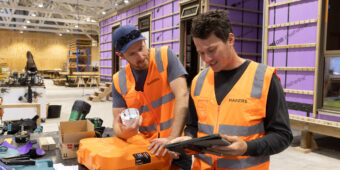Claiming tax deductions
16 Jun 2015, Business Tips, Featured, Prove Your Know How

Some people think that having more money going in to a business than going out equals profits; however, with tax being paid on top, it’s not that simple
Most business people will know that you can claim a deduction against your income for any business expenses paid for.
Major asset purchases, where deductions are claimed over the life of the asset, in the form of depreciation, are excluded. This leaves you with items such as material purchases, wages/subcontractor payments, legal and accountancy fees and so on.
As with anything in a tax return, the IRD can choose to review any claims made. Therefore, keeping good records is important.
Home office claims
One of the most easily missed deductions that a business can claim is expenses for a home office. Usually calculated based on the floor plan, you are entitled to claim a proportion of the household’s expenditure, based on the size of your office and/or workshop.
Claimable expenses include:
- Rates.
- Insurance.
- Power.
- Telephone bills.
- Interest paid on a mortgage.
However, not all household items are deductible and the IRD is vigilant in this regard. If you’re unsure about what you can claim, it’s always best to talk to an expert.
Tools
Another area that contractors tend to miss is the upfront deduction they can make on purchased tools. As a rule, you can claim a full deduction for any tool purchased for less than $500.
Any item over that amount must be added to your fixed asset register and depreciated according to the IRD’s prescribed rates. While many contractors like to use their end-of-year accounts asset schedule as a guide for what tools they have, they’re costing themselves a considerable amount by capitalising items they don’t need to.
A much better alternative is to run a completely separate schedule of tools, in order to make accurate insurance claims (if necessary) and track how old a tool is or how long it has been held by the business.
Motor vehicle expenses
Claiming a deduction for vehicle expenses is a fairly straightforward exercise; however, there are a few key areas for contractors to be aware of in order to ensure that they meet all requirements.
If you use your private vehicle for business use, you need to run a logbook for at least three months every three years to record distances travelled, dates and reasons for trips.
The distances used for business purposes can then be compared against the total amount of travel done, with expenses for the vehicle claimed on a percentage basis.
For example, if you travelled 100km for work purposes out of a total of 300km in a three-month period, you can claim 33% of the vehicle’s costs, such as petrol/diesel, repairs, insurance, etc.
If you’re claiming less than 25% as a business expense, you do not need to maintain a logbook. Bear in mind that the IRD may require you to show how you came up with the proportion that you have claimed.
“One of the most easily missed deductions that a business can claim is expenses for a home office. Usually calculated based on the floor plan, you are entitled to claim a proportion of the household’s expenditure, based on the size of your office and/or workshop
Alternatively, you can use mileage rates as prescribed by the IRD to make a claim for these expenses.
All expenses paid for vehicles owned by the business are claimable. However, if the vehicle is available for private use, an adjustment called Fringe Benefit Tax (FBT) must be paid to the IRD.
In this regard, it’s important to note the days that the vehicle was unavailable for private use – such as an overseas holiday. There is a general exclusion from FBT for ‘work-related vehicles’ that employees or shareholders store at home, do not use for private purposes and which meet the following four conditions:
- The vehicle is not designed to carry passengers (ie, utes, vans with the rear seats permanently removed).
- The vehicle has signwriting with the name of the employer/business logo on it.
- The employer has notified employees in writing that the vehicle is not available for private use.
- The employer regularly checks that employees are following the restriction noted above.
There are also additional exclusions for vehicles that are stored on an employer’s premises and vehicles over 3,500kg.
If you are concerned that you aren’t claiming the right amount of deductions, or that you may be accounting for your vehicle use incorrectly, or have any other questions about the topics detailed in this article, we can help. Please contact Peter van der Heijden at peter.vdh@crowehorwath.co.nz, or your local Crowe Horwath advisor.
Crowe Horwath has teamed up with Minter Ellison Rudd Watts and the BNZ to provide a free comprehensive training session to give you and your business the tools it needs, in order to achieve success. The next sessions are in Queenstown, 17 August and South Auckland, 16 November. For further information or expressions of interest, please contact us at Auckland@crowehorwath.co.nz.
For the contact details of your local office, please visit:
www.crowehorwath.co.nz/locations or telephone 0800 494 569.
Register to earn LBP Points Sign in



